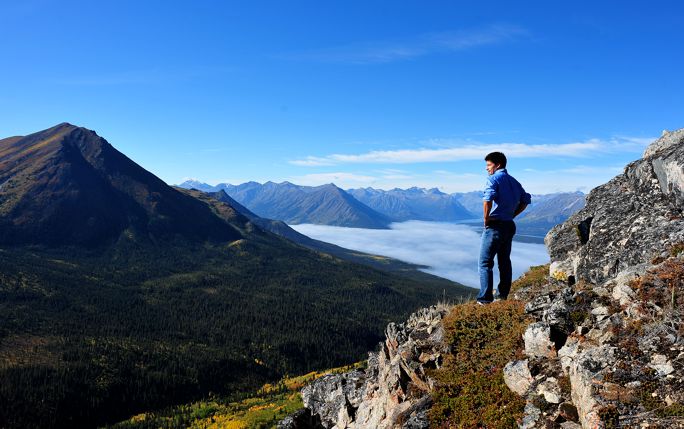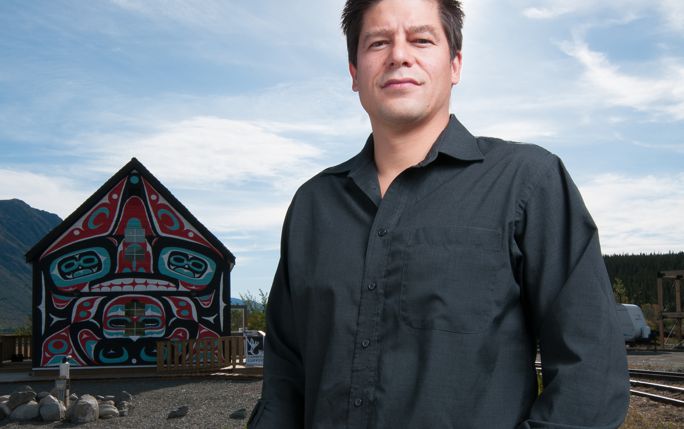Justin Ferbey lives in Yukon, Canada and is currently Deputy Minister of the Yukon Government’s Department of Economic Development. Justin also holds the concurrent position of CEO and President of the Yukon Development Corporation, a crown-corporation responsible for energy investments.
Tell us a bit about your background
I was born and raised in the Yukon and am a citizen of the Carcross Tagish First Nation. In addition to holding an MBA from the University of Liverpool, I gained a Bachelor of Arts and Science degree from the University of Lethbridge.
As well as my academic qualifications, I am an alumnus of Action Canada (a 10-month public policy leadership programme that aims to enhance young leaders’ understanding of the country and public policy choices for the future) and the US State Department's International Visitor Leadership Programme. I also have certification in dispute resolution. After spending time in South Korea and Japan and also working for federal government, I returned to my community in Carcross to help implement a self-government treaty.
Can you tell us about helping your community and some of your biggest achievements and career highlights to date?
In 2006, I was the chair of a tripartite ratification committee that oversaw the Carcross Tagish First Nations’ vote to become a self-governing First Nation. After 32 years of negotiations, the Carcross Tagish indigenous community achieved a modern treaty with Canada. This was a transformational achievement. After successfully implementing self-government, I was asked to build the First Nation’s Economic Corporation.
As CEO of the First Nation Corporation, the strategic vision I pursued resulted in international recognition. In order to survive, the community of course needs to generate an income to invest in services and support for local people. The community decided to avoid mining and logging on our land so we have invested in tourism. One of the initiatives I helped lead, the ‘Single Track to Success’ initiative, involved building 65 kilometres of mountain bike trails and helped transform the lives of youth-at-risk whilst also revitalising the community’s economy and sense of pride. In September of 2016, the Duke and Duchess of Cambridge visited Carcross to witness the transformed economy, world renowned trails, and thriving Self-Governing First Nation.
My leadership was recognised with a Meritorious Services Medal from the Governor General of Canada and I was also awarded a silver medal from the British Columbia Lieutenant Governor for academic performance and positive contribution to community.
What does your role entail as Deputy Minister for the Department of Economic Development?
The Department’s mandate is to develop a thriving, prosperous and diversified Yukon economy to enrich the quality of life of all Yukoners. This means working with First Nations, business and industry partners, and the federal and municipal governments to: broaden our economic base; build local capacity; and encourage the competitiveness of new and existing businesses and services. Our investments support sustainable job creation for Yukoners, innovative approaches to existing and new industries, increased investment opportunities, market expansion outside Yukon, and business and industry growth. The Department is also responsible for the Yukon’s immigration programmes and Yukon’s role in international trade agreements (for example, the EU – Canada Comprehensive Economic Trade Agreement).
You are also the current CEO and President of the Yukon Development Corporation (YDC), can you tell us a bit about what the corporation does?
YDC is a Crown Corporation and an Agent of the Government of Yukon. Its mandate is to promote the economic development of Yukon through the provision of safe, reliable, cost-effective energy, and energy-related infrastructure, and to alleviate the effects of any energy shortages in Yukon.
To support that mandate, YDC operates as the sole shareholder of Yukon Energy Corporation (YEC), the public energy utility, and is responsible for ensuring that YEC fulfils its mandate in a manner consistent with meeting Government objectives. YDC also works with YEC and the Government of Yukon to ensure YEC:
- Develops a plan on the future of renewable energy
- Reduces its reliance on fossil fuels as a source of electricity generation
- Operates within the territory’s financial resource limitations
YDC is also responsible for promoting the development of First-Nations and community-led renewable energy projects through its administration of the Innovative Renewable Energy Initiative and the Government of Canada’s Arctic Energy Fund. Projects span renewable energy investments in solar, wind, hydro, and bio-mass developments. It works actively both with local communities and First Nations as well as its Government of Canada counterparts to facilitate and expedite bringing locally-led energy projects through to operation.
How has the current COVID-19 pandemic impacted Yukon?
COVID-19 reached across the world and Yukon was no exception. The virus and associated travel restrictions, social distancing, and other safety measures have profoundly affected local families, economy and plans for future. It has therefore been essential that the Department of Economic Development provided urgent economic-related support to address pandemic’s impact on the economy. Amongst many initiatives, we introduced a Paid Sick Leave Rebate, the first of its kind in Canada, which allows Yukon workers without sick leave and the self-employed to stay at home if they are sick and required to self-isolate. In addition, the Yukon Business Relief Program is the backbone of our business relief programs and has been extended to March 31, 2021. It supports businesses that continue to experience losses because of COVID-19.
What has been the most challenging part of your work in helping develop Carcross Tagish community? What advice do you have for dealing with challenging situations?
It’s coming up to five years since I concludedworking in my First Nation community. When I first started, the challenge was that there were few economic opportunities for young people and there was limited job diversity. Seeking to diversify the economy required harnessing people to pursue a clearly defined vision – a vision in which people needed to see themselves reflected in the outcomes and benefits. This buy-in did not come easily. When consulting the public, I found the best strategy wasn’t one particular approach but instead to use a variety mediums and forums to convey the message of change. You have to be relentless in sharing your vision with people from all walks of life. This might require numerous public speeches or countless one-on-one conversations over tea and coffee. You have to do it all. In the early days before results are realised, many may not herald your efforts. In these instances, I found you need to bring your own good weather to the consultations. You cannot let other people’s rain clouds water down your efforts. Finding a healthy balance in life to overcome inevitable setbacks and in dealing with the stress of leading through complex and often ambiguous problems is vitally important.
Why did you decide to study for an MBA at the University of Liverpool?
Years ago, I was sailing between remote islands in Indonesia with a group of backpackers. As we passed the hours, revealing parts of our backgrounds, one traveller explained his pride in graduating from the red bricks of Liverpool. The authenticity he displayed about his alma mater stayed with me.
Years later, when we ratified a treaty with Canada the daunting task ahead of us was to implement the expansive agreements. The Final and Self-Government agreements established broad authorities involving law, business, tax, public policy, and numerous financial arrangements all needing to be created and then implemented. I knew what I did not know and thus I endeavoured to match my work responsibilities with a business programme from a world-renowned university.
I researched the University of Liverpool. As well as being a top 200 school globally, the business programme provided quality professors with the promise of studying with a cohort of international business leaders. It was an easy decision for me to matriculate into the University of Liverpool’s online MBA programme. Working on my MBA virtually every night from the remoteness of the Yukon is one of my cherished memories. It was hard days and long nights for about two years. If only I could one day return to a boat in Indonesia to tell a new friend about my fantastic education at the University of Liverpool.
What are your hopes for the future?
As the COVID-19 vaccines continue to roll out, we all hope to move beyond relief efforts towards full recovery of the health and economic well-being of the community. The lessons of Carcross – to wake up with a positive purpose and to be tireless in pursuit of a vision – has served me well.
You can read more about Justin’s extraordinary life, work and community in these articles:
Aboriginal business is rewriting the story of the North
If you’d like to learn more about the Carcross Tagish First Nation community head over to the government’s webpage.
We would like to thank Justin for taking the time to speak to us and for sharing his life and career story.

